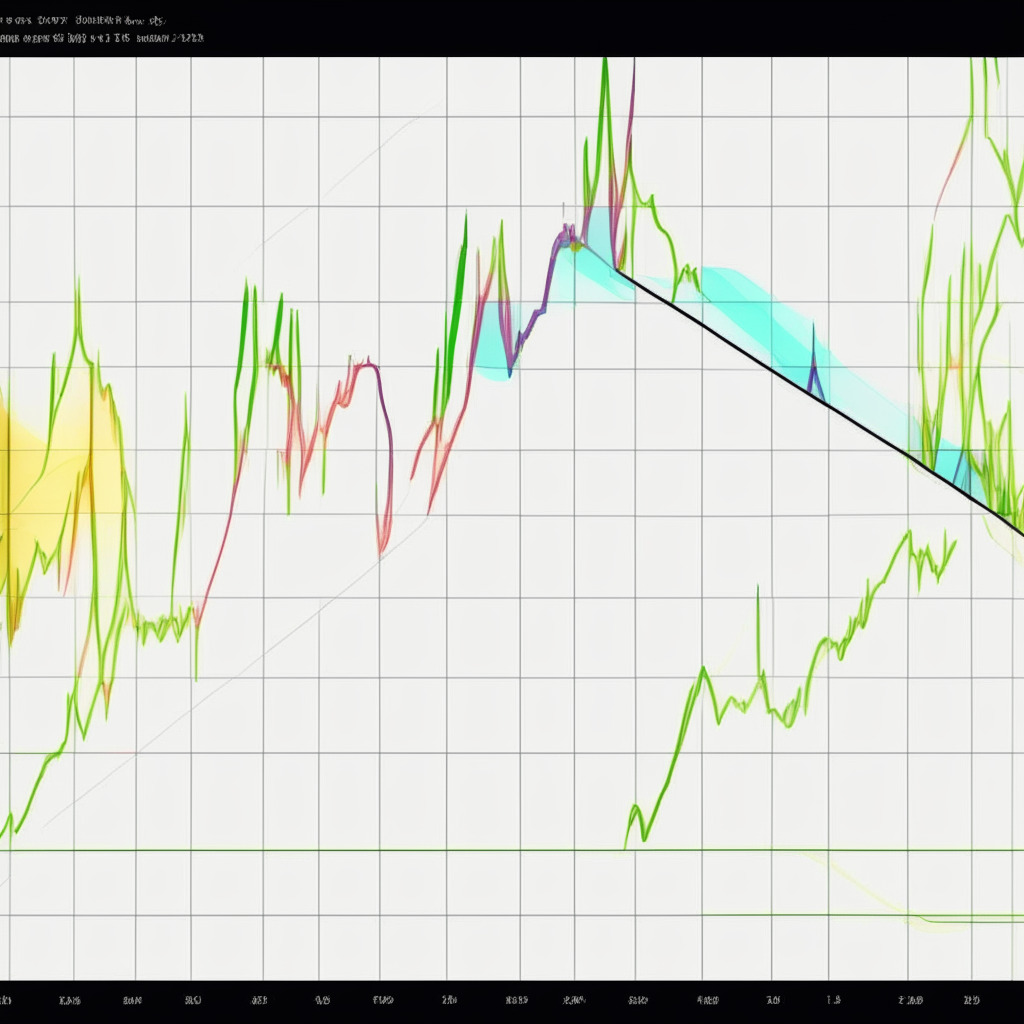Binance has reversed its decision to delist certain privacy coins within the European Union, following adjustments to comply with regional regulations. However, crypto like Monero, Beam, MobileCoin, Firo, and Horizen still face potentially being delisted. This move aligns with the EU’s modernized MiCA regulatory standards for cryptocurrency firms. As regulators seek balance, there’s concern about stifling innovation and overreaching into the privacy-focused crypto space.
Day: June 27, 2023
FTX Founder’s Criminal Trial Progress: A Battle Between Crypto Innovation and Regulation
FTX founder Sam Bankman-Fried’s trial faces multiple criminal charges, including wire fraud and bank fraud, highlighting the ongoing debate surrounding cryptocurrency regulations. The case emphasizes the struggle between emerging digital assets and traditional financial regulations, potentially shaping the landscape of cryptocurrency regulations and the digital asset market.
Grayscale vs SEC: The Battle for Bitcoin ETF Approval and Its Impact on Crypto Market
The Grayscale Bitcoin Trust (GBTC) experiences a surge in trading volume amid increasing attention towards Bitcoin ETFs. Experts suggest that the SEC may soon approve Grayscale’s Bitcoin ETF application. Grayscale currently has a 70% chance of winning their lawsuit against the SEC, potentially forcing ETF approval by August 2023.
Recovering $1.3B from 3AC Founders: The Dark Side of Crypto Market and Its Impact on Investors
Teneo liquidators are seeking to recover $1.3 billion from Three Arrows Capital founders Su Zhu and Kyle Davies, who reportedly incurred the debt while the hedge fund was insolvent. This case highlights the challenges in the expanding crypto world and emphasizes the need for increased oversight and regulation to ensure investor safety.
$1.3B Recovery Battle: Lessons from 3AC’s Collapse and the Future of Crypto Regulation
Liquidators are seeking $1.3 billion from Three Arrows Capital’s founders, Su Zhu and Kyle Davies, following the crypto hedge fund’s bankruptcy. The lawsuit highlights the need for increased transparency, oversight, and regulatory measures in the cryptocurrency space to ensure security and accountability.
Shiba Inu Price Recovery: Analyzing Resistance, Downtrend, and Future Prospects
Shiba Inu price experienced recovery, encountering resistance and a potential downtrend due to high supply. Decentralized exchange usage is advised for SHIB holders. For a lasting recovery, surpassing the resistance trendline is vital, while bearish momentum dominates the market.
Hong Kong Crypto Firms Invest Heavily in VASP Licenses: Balancing Compliance and Innovation
Web3 firms in Hong Kong are spending substantial amounts to obtain Virtual Asset Licensing Regime (VASP) licenses, highlighting the industry’s commitment to compliance and regulation. However, high licensing costs may deter smaller firms from entering the market, potentially stifling innovation and limiting competition in blockchain and cryptocurrency sectors.
Swiss CBDC Pilot Launch: Exploring Potentials and Addressing Risks in Digital Currencies
Swiss Central Bank’s Chairman, Thomas Jordan, announced the launch of a wholesale Central Bank Digital Currency (CBDC) pilot program on Switzerland’s SIX digital exchange. Despite exploring CBDC potential, the Swiss Central Bank remains cautious about adopting retail CBDCs due to possible financial system risks.
Ark vs BlackRock: Battle for the First Spot-Bitcoin ETF Approval Heating Up
ARK Investment Management believes it has secured frontrunner status for spot-Bitcoin ETF approval, despite BlackRock leading the race. USDC CEO Jeremy Allaire mentioned well-regulated custody infrastructures, mature spot markets, and effective market surveillance as factors supporting potential approval.
CeFi vs DeFi: Learning from Decentralized Practices for User Empowerment & Inclusivity
DeFi shines in user empowerment, transparency, and reach, setting high expectations for CeFi companies. To stay competitive, CeFi should foster financial inclusivity, prioritize transparency, adopt community-driven decision-making and interoperability, and emphasize user control over assets.
Australian Activist Claims CCP Bitcoin Bounty on His Family: Exploring Crypto’s Role in State-Sponsored Intimidation
An Australian human rights activist claims the Chinese Communist Party (CCP) has put a $50,000 Bitcoin bounty on his family’s heads through emails from “DP Bounty Hunters.” Crypto’s borderless nature and use of mixers complicates tracking the sender, highlighting potential use in state-sponsored intimidation and illegal activities.
Tokyo and Hong Kong: Rising Crypto Hubs or Regulatory Challenges? Pros and Cons Debated
Tokyo and Hong Kong are emerging as prominent crypto hubs as they proactively attract crypto businesses and implement regulatory safeguards. Despite challenges, their clear support for the industry signals a shifting landscape and underscores the importance of adaptability in the crypto ecosystem.
Public vs Private Blockchains: Leveraging Permissioned Systems for Secure Asset Tokenization
The potential of blockchain technology in improving settlement through asset tokenization is acknowledged, but skepticism arises about the viability of public blockchains. The solution lies in public permissioned blockchains, which provide security, scalability, transparency, and regulatory compliance while preserving decentralization. These blockchains are beneficial for financial markets and decentralized finance (DeFi) onboarding with the right infrastructure.
June 2023: Game Changer for Bitcoin ETFs as Major Corporations Join In – Pros and Cons
June 2023 marks a pivotal moment for Bitcoin ETFs as major corporations like Blackrock, Invesco, WisdomTree, and Bitwise submit applications to the SEC. This could boost the crypto market and potentially alter cryptocurrency perception among traditional financial market participants.
Fidelity’s Bitcoin ETF Pushes BTC Above $31K: Bullish Future or Short-Lived Rally?
Bitcoin price surges above $31,000, driven by rumors of Fidelity Investments filing for a Bitcoin spot-based ETF. Analysts anticipate possible surge to $38,000 if price holds between $32,000-$33,000. Despite skepticism, the overall sentiment leans towards a bullish trend.
MATIC Price Recovery: Can Polygon Coin Surpass $0.75 Amid Market Sentiment Shift?
The MATIC price displays a steady uptrend with dynamic support to buyers, suggesting the potential to surpass the $0.75 mark. However, decreasing volume in its current recovery and possible selling pressure from overhead trendlines could impact this momentum. Technical indicators suggest a short-term buy signal, but market conditions remain subject to change.
Blockchain Future: Trustless Environment vs. Environmental Impact & Market Volatility
Blockchain technology promotes transparency, security, and decentralization, revolutionizing various sectors like finance, healthcare, and supply chains. However, challenges like environmental impact, regulation issues, and market volatility must be addressed for its potential benefits to fully emerge.
BlackRock ETF Filing: A Boon or Bane for Grayscale’s GBTC Future and Crypto Market
BlackRock’s recent spot Bitcoin ETF filing has raised questions about Grayscale’s future strategy. If Grayscale successfully converts its current structure into an ETF, it may benefit from reduced pricing deviation and enable 1:1 equivalent redemption between GBTC shares and Bitcoin. However, the SEC’s rejection of Grayscale’s 2022 ETF application remains a challenge.
XRP Lawsuit, Ripple’s Legal Battle and the Significance of Amicus Briefs in Crypto Regulations
The XRP lawsuit filed by the SEC against Ripple Labs impacts prices and businesses, while XRP holders’ lawyer, John Deaton, invests in Amicus Curiae SpendTheBits. This highlights the risks, regulations, and complexities in the cryptocurrency market, emphasizing the need for trust and integrity in blockchain development.
Bybit’s Dubai License: Adapting to Global Regulatory Landscape & the Future of Crypto Exchanges
Dubai’s Virtual Assets Regulatory Authority grants Bybit a restricted MVP license, enabling service to a limited set of accredited investors. The exchange aims to obtain a full market product license to expand its services across the UAE.
Traditional IRA vs Bitcoin IRA: Weighing the Risks and Rewards for Retirement Planning
This article discusses the differences between traditional IRAs and Bitcoin IRAs as retirement investment options, highlighting their risks, rewards, and unique features. It emphasizes the importance of individual investment goals, risk tolerance, and consulting professionals before making decisions about retirement planning in the evolving crypto market.
Mythical Games’ $37M Funding and the Future of NFT-Powered Gaming
Mythical Games, a Web3 game studio, recently raised $37 million in a Series C1 funding round led by Scytale Digital, with participation from ARK Invest, Animoca Brands, and others. The company focuses on NFT-based games like NFL Rivals and is working on integrating more Web3 elements and educating players about tradable assets.
Mixed Crypto Market Trends: Navigating Gains, Losses & Making Informed Decisions
Cryptocurrencies show mixed trends, with BTC and ETH experiencing gains while XRP and DOGE face dips. Investors must navigate the volatile market, considering factors like governmental regulations, expert opinions, and potential long-term growth. Staying informed and diligent can make a difference in investment strategy.
Mythical Games Secures $37M Funding: Web3 Gaming’s Future & Legal Battles Unfold
Web3 gaming studio Mythical Games recently raised $37 million in the first part of their Series C extension round, reaching a $1.25 billion valuation. The firm plans to optimize its business model, enhance infrastructure, and launch new games in 2023.
Bitcoin’s 85% Rally: Analyzing Fairlead’s Neutral Stance and Future Market Predictions
Despite Bitcoin’s impressive 85% rally in H1 2023, Fairlead Strategies retains a long-term neutral outlook. A bullish bias will emerge once BTC surpasses the Ichimoku cloud resistance of $31,900 and receives momentum indicators’ support. This emphasizes the importance of continuous market monitoring and analysis for crypto enthusiasts and investors.
Bitcoin Cash Surge: Sustained Growth or Temporary Boost from EDX Listing?
Bitcoin Cash has surged 115.5% in price, reaching $236.6, likely due to its listing on EDX Markets. The rally may lead to an 11.5% increase hitting the $260 mark, but a potential correction phase and resistance level could impede further growth.
EU Crypto Regulations and Market Innovations: Balancing Growth and Compliance
The EU proposes “prohibitive” rules to keep unbacked crypto out of the traditional financial system, while Fireblocks expands support for major cloud providers and OKX launches Nitro Spreads feature for OTC institutional liquid market. Digital asset investments surge, but upcoming regulations may impact growth and innovation.
Unmasking the Chibi Finance Rug Pull: A DeFi Scam Masterclass and Wake-Up Call for Investors
The Arbitrum-based project Chibi Finance conducted a rug pull scam, stealing over $1 million worth of tokens using a malicious contract. This highlights the challenges and pitfalls in decentralized finance (DeFi) and the need for investors to exercise caution and conduct due diligence.
Navigating the Crypto Regulatory Maze: Global Framework vs Local Advantages
The crypto industry faces a crossroads due to evolving worldwide regulations, with companies reassessing their positions and seeking crypto-friendly jurisdictions. However, the lack of a global regulatory framework hinders market growth and stability, prompting calls for a coordinated effort to establish global standards and support beneficial innovation.
EU’s New Crypto Regulations: Balancing Innovation and Financial Stability
The European Union has reached a political agreement on updating the Capital Requirements Regulation and Directive, introducing new regulations for crypto assets to address concerns over “unbacked cryptocurrencies” entering the traditional financial system. The updated regulations aim to boost the strength and resilience of banks, with a “transitional prudential regime for crypto assets” included.
Dubai’s Rise as Crypto Hub: Regulatory Excellence vs Low Adoption – Can It Succeed?
Dubai and Abu Dhabi excel in regulatory structure for cryptocurrency innovation, but low crypto adoption persists. The UAE’s proactive approach, diverse population, and strategic location foster blockchain use cases and attract major players, aiming to create a top metaverse economy and virtual jobs by 2030.
FCA Leadership Shift: Impact on Crypto Regulation and Industry Future
Binu Paul, former head of digital assets at the FCA, leaves the organization after nine months, and Victoria McLoughlin steps in as interim Head of Market Interventions for digital assets. This leadership change occurs amid the FCA’s intense focus on regulating the emerging crypto industry and enforcing stricter advertising rules for crypto services. McLoughlin’s experience at the FCA signals a continued stable approach to cryptoasset regulation.































